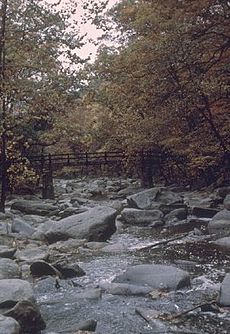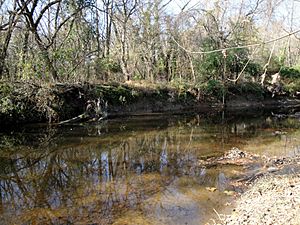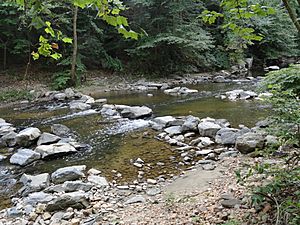Rock Creek (Potomac River tributary) facts for kids
Quick facts for kids Rock Creek |
|
|---|---|

Rock Creek, Washington, D.C.
|
|
| State | Maryland |
| County | Montgomery County, Maryland |
| Cities | Rockville, Maryland Washington, D.C. |
| Physical characteristics | |
| Main source | Laytonsville, Maryland 560 feet (170 m) 39°11′56″N 77°08′20″W / 39.1990012°N 77.1388044°W |
| River mouth | Potomac River 0 feet (0 m) 38°53′58″N 77°03′26″W / 38.899556°N 77.0572°W |
| Length | 32.6 miles (52.5 km) |
| Basin features | |
| Basin size | 76.5 square miles (198 km2) |
| Landmarks | Rock Creek Park |
| Waterbodies | Lake Needwood |
Rock Creek is a natural stream that flows into the Potomac River. The Potomac River then carries its water to the Chesapeake Bay and finally to the Atlantic Ocean. Rock Creek is about 32.6 miles (52.5 km) long. It drains an area of about 76.5 square miles (198 km2). The last part of the creek, about 400 metres (1,300 ft), is affected by ocean tides.
Contents
Where Does Rock Creek Flow?
Rock Creek starts from a spring near Laytonsville, Maryland. This is in Montgomery County, Maryland. The creek then flows south through Maryland. It enters Rock Creek Park in Washington, D.C. Finally, it joins the Potomac River near Georgetown.
Rock Creek's Journey Through Parks and Cities
The creek flows through Rock Creek Regional Park in Maryland. Then, about 9 miles (14 km) of the creek flows through Rock Creek Park in Washington, D.C. Many smaller streams join Rock Creek in the park. These include Piney Branch and Broad Branch.
How Rock Creek Connects to Other Waterways
The Chesapeake and Ohio Canal meets Rock Creek in Georgetown. The creek's mouth is where the canal ends. This area was once called "Rock Creek Basin." It was used by the canal for boats. The creek and the canal both flow into the Potomac River at the Tidewater Lock.
Understanding the Rock Creek Area
The area that Rock Creek drains is called its watershed. The Maryland part of the watershed is about 60 square miles (160 km2). This is the second-largest watershed in Montgomery County. About 21 percent of the watershed is in Washington, D.C.
The land around the creek is used in different ways. There are wetlands, forests, and farms. There are also many homes and businesses. The creek flows downhill quickly in some places. Lake Needwood, a man-made lake, is located on the creek north of Rockville, Maryland. The USGS keeps an eye on the conditions in Rock Creek.
Keeping Rock Creek Clean: Water Quality and Restoration

The water quality in Rock Creek changes along its path. In northern Maryland, the water is generally good. To keep it clean, Montgomery County has rules about new buildings in some areas.
However, in southern Maryland, where there are more cities, the water quality is not as good. The county has been working on projects to restore the stream. They have more projects planned for the future.
Challenges in Washington, D.C.
The part of Rock Creek in Washington, D.C., also has water quality problems. Rainwater runoff from streets carries pollution into the creek. Also, sometimes combined sewers overflow. This means sewage can mix with rainwater and flow into the creek.
The D.C. government is working to fix these issues. They are improving how they manage stormwater. They are also replacing old combined sewers with separate pipes for stormwater. This helps reduce pollution in the creek.
Fish Life in Rock Creek
Many types of fish live in Rock Creek and its smaller streams. Some common fish include eastern blacknose dace, bluntnose minnow, and American eel.
Projects to Help Fish and the Creek
In 2006, the National Park Service completed a project to help fish. They removed or changed things that blocked fish from swimming upstream. For example, they added a fish ladder to help fish get past the Peirce Mill Dam. They also removed old sewage pipes.
These efforts help fish like American shad and river herring swim up the creek. This allows them to reach their historic spawning grounds. It is estimated that two million fish migrate up the creek each year.
The D.C. government has also completed other restoration projects. These include work on the Milkhouse Run and Bingham Run streams. More projects are ongoing to improve the health of the entire Rock Creek watershed.
Streams That Join Rock Creek (Tributaries)
Here are some of the smaller streams that flow into Rock Creek, listed from the mouth of the creek upstream:
- In Washington, D.C.
- Dumbarton Oaks
- Normanstone Creek
- Klingle Valley Creek (also called Klingle Creek, Klingle Run)
- Piney Branch
- Melvin Hazen Valley Branch
- Broad Branch
- Soapstone Branch
- Luzon Branch
- Milkhouse Run
- Bingham Run
- Pinehurst Branch
- Fenwick Branch
- Portal Branch
- In Maryland
- Donnybrook Tributary
- Coquelin Run
- Capitol View Tributary
- Kensington Heights Branch
- Stoney Creek
- Alta Vista Tributary (formerly Bethesda Run)
- Luxmanor Branch
- Stoneybrook Tributary
- Josephs Branch
- Turkey Branch
- Sycamore Creek
- Croydon Park Tributary
- Southlawn Branch
- Williamsburg Run
- North Branch (Lake Bernard Frank)
- Lake Needwood (this lake is directly on Rock Creek)
- Crabbs Branch
- Mill Creek
- Pope Farm Branch
- Airpark Road Branch
Images for kids
-
Rock Creek near its terminus at the Potomac River in Georgetown
 | DeHart Hubbard |
 | Wilma Rudolph |
 | Jesse Owens |
 | Jackie Joyner-Kersee |
 | Major Taylor |






